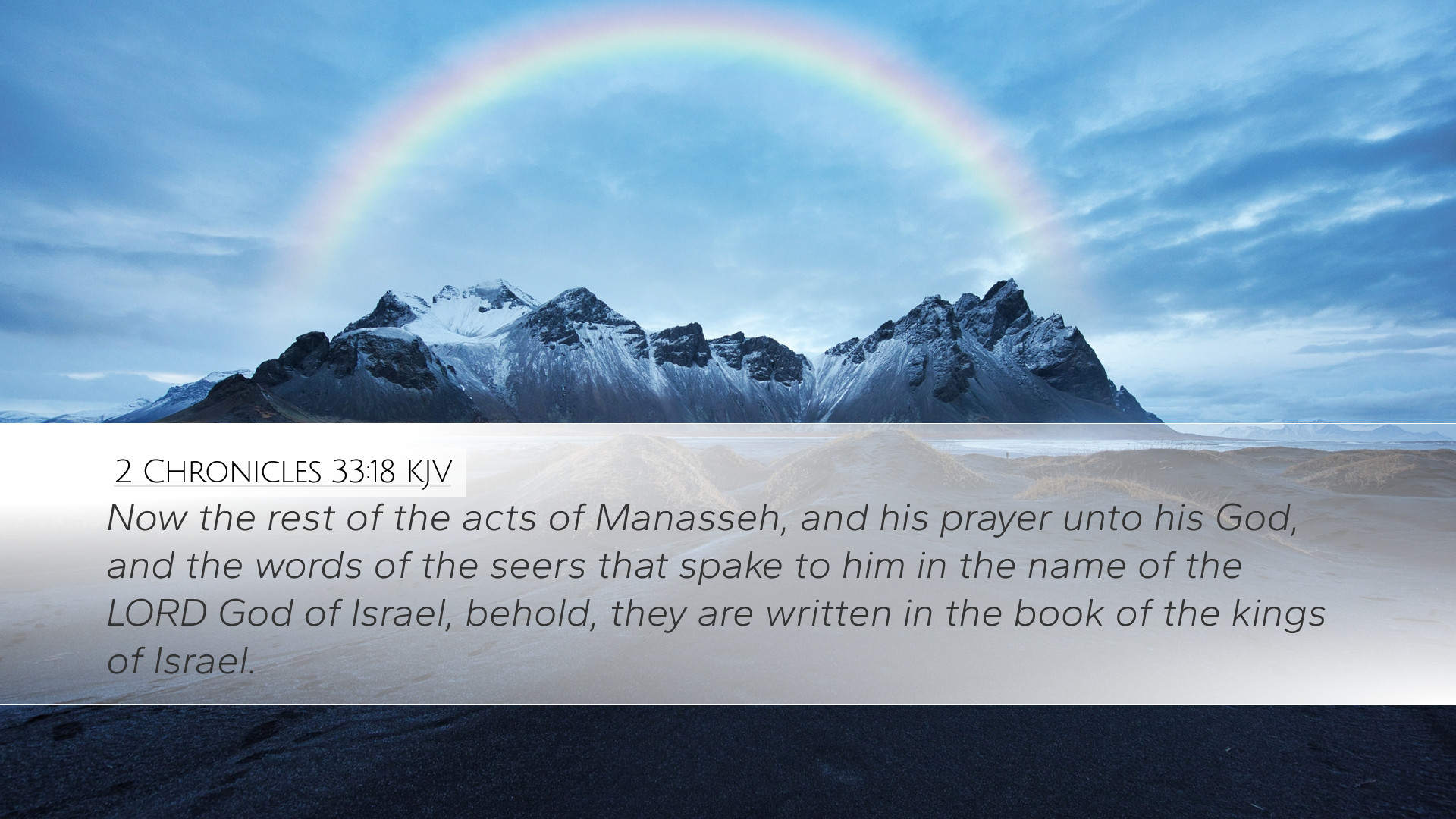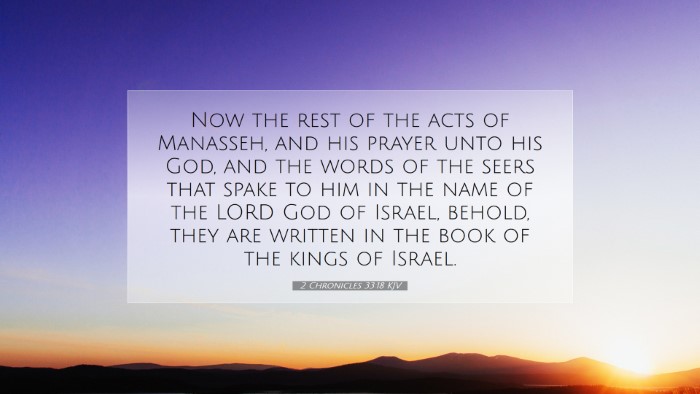Commentary on 2 Chronicles 33:18
Verse: "Now the rest of the acts of Manasseh, and his prayer unto his God, and the words of the seers that spake to him in the name of the Lord God of Israel, behold, they are written in the book of the kings of Israel."
Introduction
The verse of 2 Chronicles 33:18 serves as a conclusion to the record of King Manasseh's reign, documenting his prayer of repentance and the prophetic messages directed towards him. This reflection is pivotal for understanding the themes of sin, repentance, and restoration in the history of Israel. Public domain commentaries highlight the lessons derived from Manasseh's actions and God's merciful response.
Context of Manasseh's Reign
Manasseh, reigning in Judah for fifty-five years, is noted for his profound idolatry and the shedding of innocent blood, which led to the judgment of God upon the nation. Matthew Henry highlights that despite these grievous sins, the narrative emphasizes God's willingness to forgive upon true repentance.
Manasseh's Repentance
Albert Barnes elaborates on the significance of Manasseh's prayer as a sincere act of repentance. After being taken captive by the Assyrians, Manasseh found himself in distress and turned to God, seeking forgiveness. This moment signifies a turning point, demonstrating that even the most wicked can be redeemed. Clarke notes that his prayer reflects a genuine acknowledgment of his sins and a heartfelt plea for mercy.
This prayer is crucial in understanding the broader implication of divine mercy. It illustrates that God’s grace can reach the deepest sinner, showcasing His capacity to restore. Indeed, Manasseh’s story serves as a testament to the power of repentance, and as such, it is pivotal for pastors and theologians to reflect on the transformative nature of grace.
The Role of Prophets
In this verse, the mention of "the words of the seers" signifies the role of prophets in guiding the nation of Judah. The prophets, representing God’s voice, admonished the king in his times of rebellion, signaling divine displeasure. Henry emphasizes that these prophetic messages were crucial not only for Manasseh but for the entire kingdom. They bore witness to God’s desire for His people to repent and return to His ways.
This highlights the importance of prophetic ministry and its contemporary relevance. The teachings of the prophets still resonate today, and their exhortations should encourage believers to seek alignment with God's will through prayer and humility.
Documentation of Manasseh's Life
The phrase "behold, they are written in the book of the kings of Israel" indicates that Manasseh's actions and repentance are recorded for the sake of historical and spiritual reflection. Adam Clarke notes that the chronicler aimed to provide a comprehensive account, allowing later generations to learn from past failures and successes. This historical record serves as a reminder of God's faithfulness despite human frailty.
For scholars and students of theology, this invites a deeper exploration of historical documents, provoking questions about how the narratives shape theological understanding and the lessons learned from the biblical accounts.
Theological Implications
This verse imparts significant theological truths relevant to the doctrine of repentance, redemption, and divine sovereignty. One of the core lessons is the transformative power of turning away from sin. As highlighted by Henry, no sin is beyond the reach of God's forgiveness when one approaches Him in true penitence.
Moreover, the chronicler's account emphasizes that God’s righteousness does not preclude His mercy. Manasseh’s change confirms that even the most pronounced failures can lead to profound victories if repentance is genuine. This theme is crucial for instructing congregations about the nature of God’s grace and the importance of repentance.
Conclusion
In summary, 2 Chronicles 33:18 encapsulates a narrative rich in lessons about sin, repentance, and the mercy of God. By studying Manasseh’s life and reign, pastors and scholars can glean valuable insights into God's character and the response expected from His people. The acts and prayers of Manasseh serve as a beacon of hope, reminding all believers that redemption is always within reach for those who earnestly seek it.
As such, this passage invites continued reflection, fostering a posture of humility, repentance, and gratitude for God's unwavering grace.


